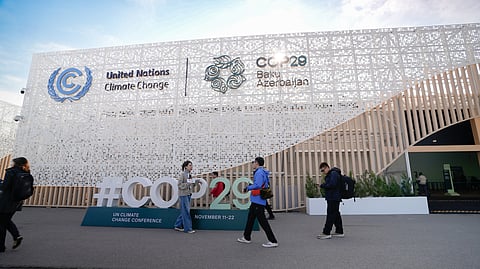

The agreement on the standards for generating carbon credits under Article 6.4 of the Paris Agreement at the recently concluded 29th Conference of Parties (COP29) to the United Nations Framework Convention on Climate Change in Baku, Azerbaijan has sparked a debate among global stakeholders.
Some experts argue that the decision represents a pivotal moment in global climate action, especially for African countries, as it establishes a regulated international carbon market to reduce greenhouse gas emissions. Others, particularly activists from Africa, believe market-based mechanisms don’t work and safeguards have not protected indigenous people from the predatory and land-grabbing practices of carbon brokers.
Pedro Martins Barata, associate vice president for carbon markets and private sector decarbonisation at the nonprofit Environmental Defense Fund, praised the approval. “The adoption of Article 6 is a historic milestone in establishing carbon market cooperation to boost ambition and mobilise urgent climate finance. However, we need critical fixes on Article 6.4 standards to ensure nature-based solutions and the communities protecting these resources aren’t sidelined,” said Barata.
A section of activists from Africa, led by the Pan African Climate Justice Alliance (PACJA), has protested the move, arguing that carbon trading serves as a “license to pollute,” enabling wealthier nations to sidestep their climate obligations while shifting the burden onto poorer countries.
In a statement to the press, PACJA Executive Director Mithika Mwenda said carbon markets have been largely a domain of highly polluting private sector operators in developed countries, blurring the urgency for cutting emissions and presenting a false solution to climate action.
“Carbon markets must be denounced as greenwashing and false narratives, as they are not solving the underlying problem of emissions by developed countries. We call for renegotiation of Article 6.4 on carbon markets to better align it with the urgent call for limiting emissions in line with the Paris Agreement," said Mwenda.
Adopted at COP21 in 2015, Article 6.4, a key component of the framework of cooperation in the Paris Agreement, was designed to foster international collaboration in achieving climate targets through carbon markets. Some of the critical standards necessary for the implementation of Article 6.4 include standardised methodologies, a focus on carbon removal projects, and strengthened oversight and integrity.
The majority of African presidents at COP29 appeared pleased with the ratification of Article 6.4, seeing carbon credits as an opportunity for boosting the continent’s climate finance. This was made clear during a high-level meeting titled ‘Measuring the Green Wealth of Africa’, jointly convened by the President of the Republic of Congo, Denis Sassou Nguesso, Kenya’s Prime Cabinet Secretary Musalia Mudavadi and African Development Bank (AfDB) President Akinwumi Adesina.
The session was attended by Presidents Paul Kagame of Rwanda, Zimbabwe’s Emmerson Mnangagwa, and Faure Essozimna Gnassingbé of the Republic of Togo, among other high-level government representatives from other African states.
The consensus among the presidents was that the operationalisation of Article 6.4 offers African nations an advantage in climate negotiations. They believe a structured framework will allow the continent to access international carbon markets while leveraging their abundant natural resources and helping unlock climate finance.
The continent faces a huge climate finance gap and needs approximately $2.8 trillion between 2020 and 2030 to meet its Nationally Determined Contributions (NDCs). Currently, the climate finance flows to the continent, valued at $44 billion annually in 2021/2022, fall far short of the estimated need.
Nguesso said a regulated carbon market under Article 6.4 “could attract investments in projects that align with local development priorities, including emissions reductions and poverty alleviation”. The shift positions the continent as an active contributor to global climate solutions rather than a passive recipient of aid.
President Paul Kagame of Rwanda expressed full support for Africa’s initiative to measure and value its natural capital, arguing that such a bold agenda would address the persistent challenge of accessing adequate climate financing. “We are not asking for handouts,” he said. “We are asking the world to pay for resources that hold immense value for all of us.”
Mudavadi, representing Kenyan President William Ruto, underscored the need to recognise Africa’s ecosystem services — such as carbon sequestration and pollution control — as global public goods. He noted that “assigning appropriate economic value to Africa’s green wealth would not only attract vital financial investments but could also enhance credit ratings for African nations”.
Despite the excitement about the potential benefits of Article 6.4, its implementation is fraught with challenges that critics say could undermine its effectiveness. Several independent entities have released investigative reports, questioning the opacity surrounding carbon credits. Multiple reports indicate that, save for global carbon registries, no government database exists on the number of projects that have been signed by different entities for carbon credits.
Other common challenges cited by independent institutions and climate activists like PACJA include a lack of consensus on methodologies for carbon removal projects and eligibility criteria. Administrative complexities, such as establishing a robust infrastructure to operationalise Article 6.4, also pose significant challenges. The costs associated with meeting stringent regulatory requirements may discourage participation from developing nations.
Describing Baku as one of the worst deals in the history of COPs, Mwenda said: “This is a bold departure from the Paris Agreement, centring carbon markets in climate finance as opposed to their contribution to reducing emissions—a role this market has played with dismal performance, peaking emissions and violations of human rights”.
He further added that past scandals involving fraudulent carbon offsets have damaged stakeholders' trust in the integrity of carbon markets, casting doubts on the effectiveness of the markets as a climate finance solution.